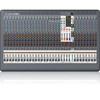Behringer XENYX XL3200 Manual - Page 16
Fx Master Mon, Aux, Group, Main, Solo Level, Pfl/afl, Cd/tape, Level, Phones/speaker
 |
View all Behringer XENYX XL3200 manuals
Add to My Manuals
Save this manual to your list of manuals |
Page 16 highlights
16 XENYX XL3200/XL2400/XL1600 User Manual MON, AUX, GROUP, MAIN These push-button switches (MON, AUX, GROUP and MAIN) determine to which outputs and buses the talkback signal is to be routed. Then, turn on the talkbalk microphone. Press and hold down the push-button switch while speaking into the microphone. 5.6.2 SOLO SOLO LEVEL The SOLO LEVEL control adjusts the volume level of all solo signals routed to the headphone and loudspeaker outputs. PFL/AFL Press the PFL/AFL switch to change the solo functionality from PFL mono (pre-fader listen) to AFL stereo. The LED next to the switch indicates the selected state. In PFL mode, the signal is tapped before the fader when pressing the solo switch. In AFL mode, the signal is tapped behind the fader and in stereo for a correct positioning within the stereo image. If you adjust the signal's level with the TRIM control, select the PFL mode so that the displayed level is not affected by the channel fader. LEVEL The LEVEL control adjusts the volume level of the signal routed to the MAIN B output. STEREO/MONO The STEREO/MONO switch changes the Main B signal from mono to stereo depending on the situation. For example, a mono signal is usually used for a center cluster. PRE/POST The PRE/POST switch is used to determine whether the signal is tapped in front or behind the MAIN A fader. 5.7 FX master section 5.6.3 CD/TAPE LEVEL The LEVEL control adjusts the signal in the main mix, for example, when connecting the CD/tape inputs to a CD player. MAIN Press the MAIN switch to route the CD signal to the main output. The CD signal remains audible even when the MAIN MUTE switch is pressed. This allows you to play music during performance breaks. 5.6.4 PHONES/SPEAKER section The PHONES A/B control adjusts the volume level of the headphone output. ◊ IMPORTANT! High volume levels may damage your hearing and/or your headphones/loudspeakers. To avoid switch-on/off thumps from the console and any downstream devices, always make sure that the power amp(s) or active speaker(s) are the last components that are switched on and the first to be switched off. Always make sure that the appropriate volume is set. SPKR The Speaker control adjusts the volume level of the SPEAKERS outputs. SOURCE The SOURCE push-button switch selects the signal source for the headphone and loudspeaker outputs (main or CD/TAPE signal). Pressing a solo switch routes the solo signal to these outputs and is not affected by the SOURCE push-button switch. MAIN B section The mixer sum can also be routed to the MAIN B output which may be connected to a separate power amplifier. This way the sum can be sent to multiple zones and various loudspeaker groups (for example, center clusters and front fills). One may also want to connect a stereo recording system for live recording. This section has additional inputs for signals which do not require further signal processing. Ideally, use them for signals returning from external effects units. This is why these inputs are referred to as FX returns. It is possible to route the effect signals to the monitors and subgroups. This way the stereo channels can be used for additional stereo signals, such as keyboards, etc., and not for effects units' signals which require functions like fader, routing, solo and mute. FX SEND This is the master FX SEND control for adjusting the volume of all FX send signals at the corresponding FX send jacks and at the inputs of the built-in effects processor. Use it to control the master signal of all FX 1/FX 2 signals from the input channels. When neither of the FX SEND controls is turned up, the effects processor will not receive a signal.















